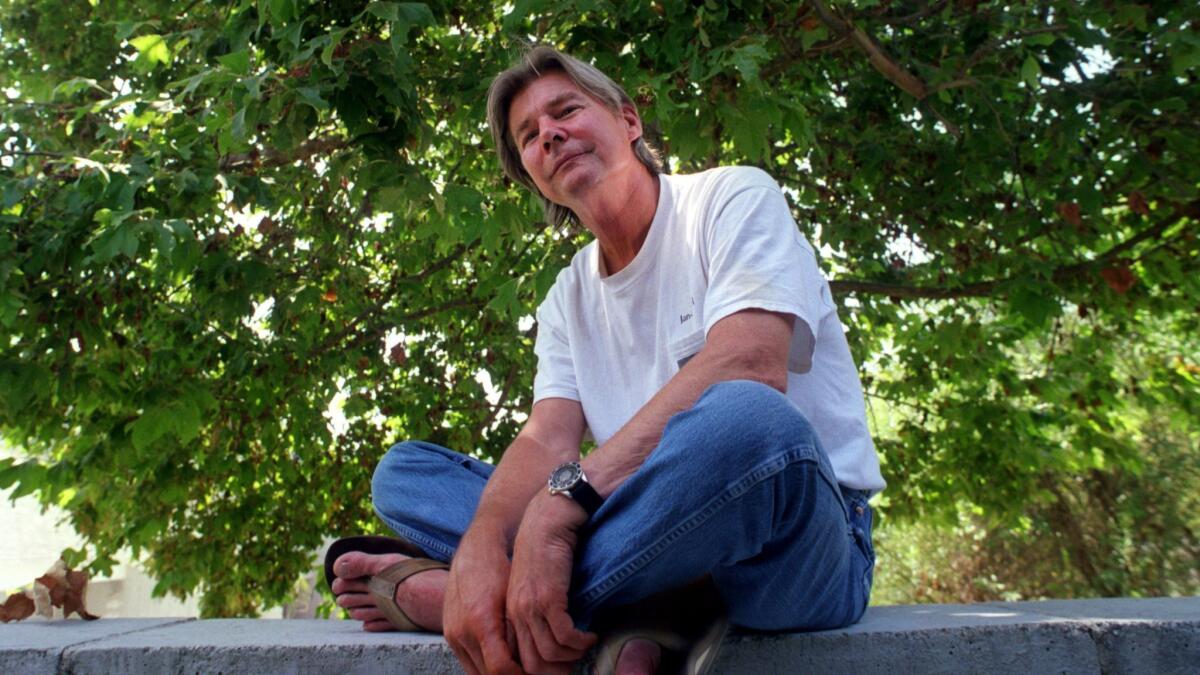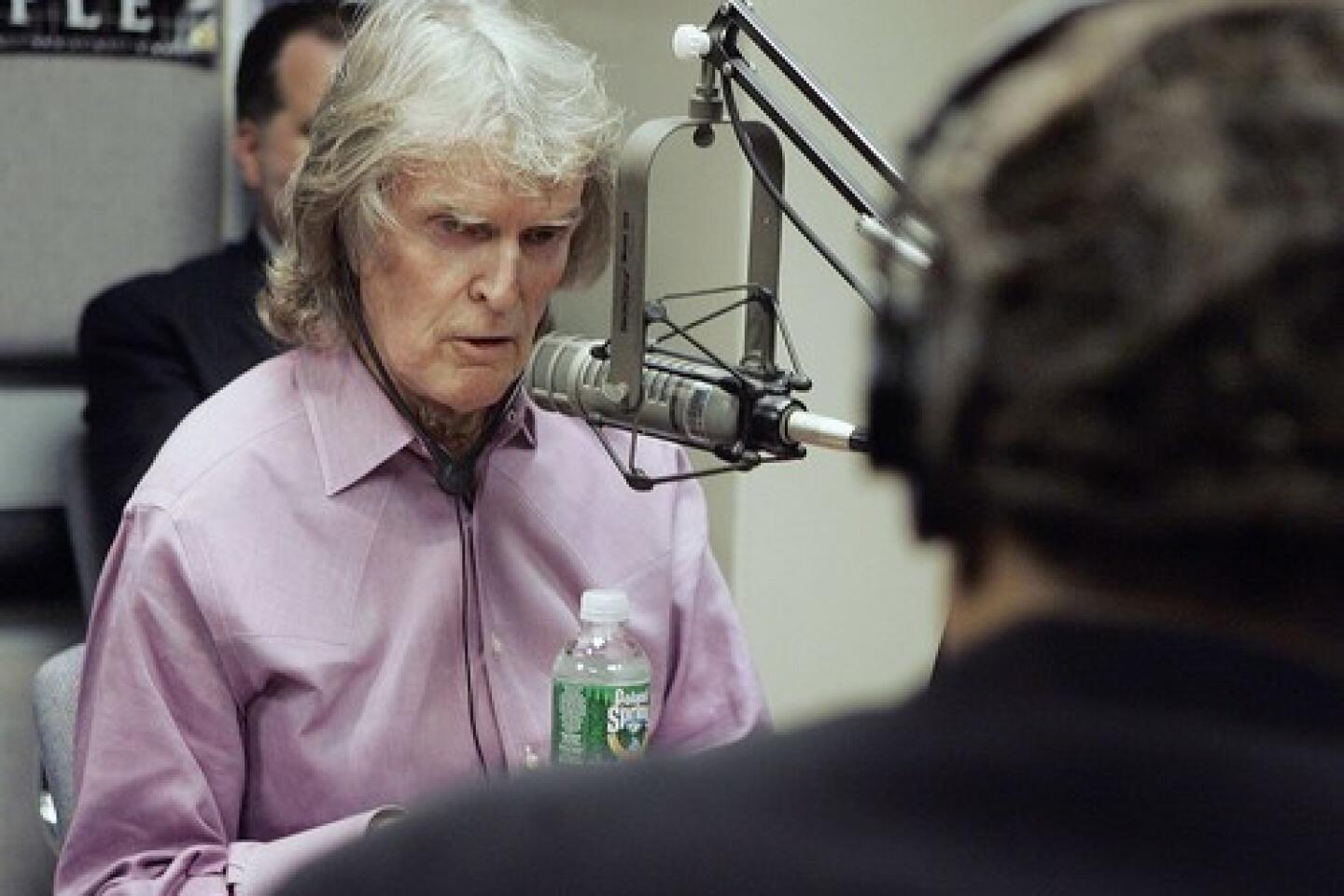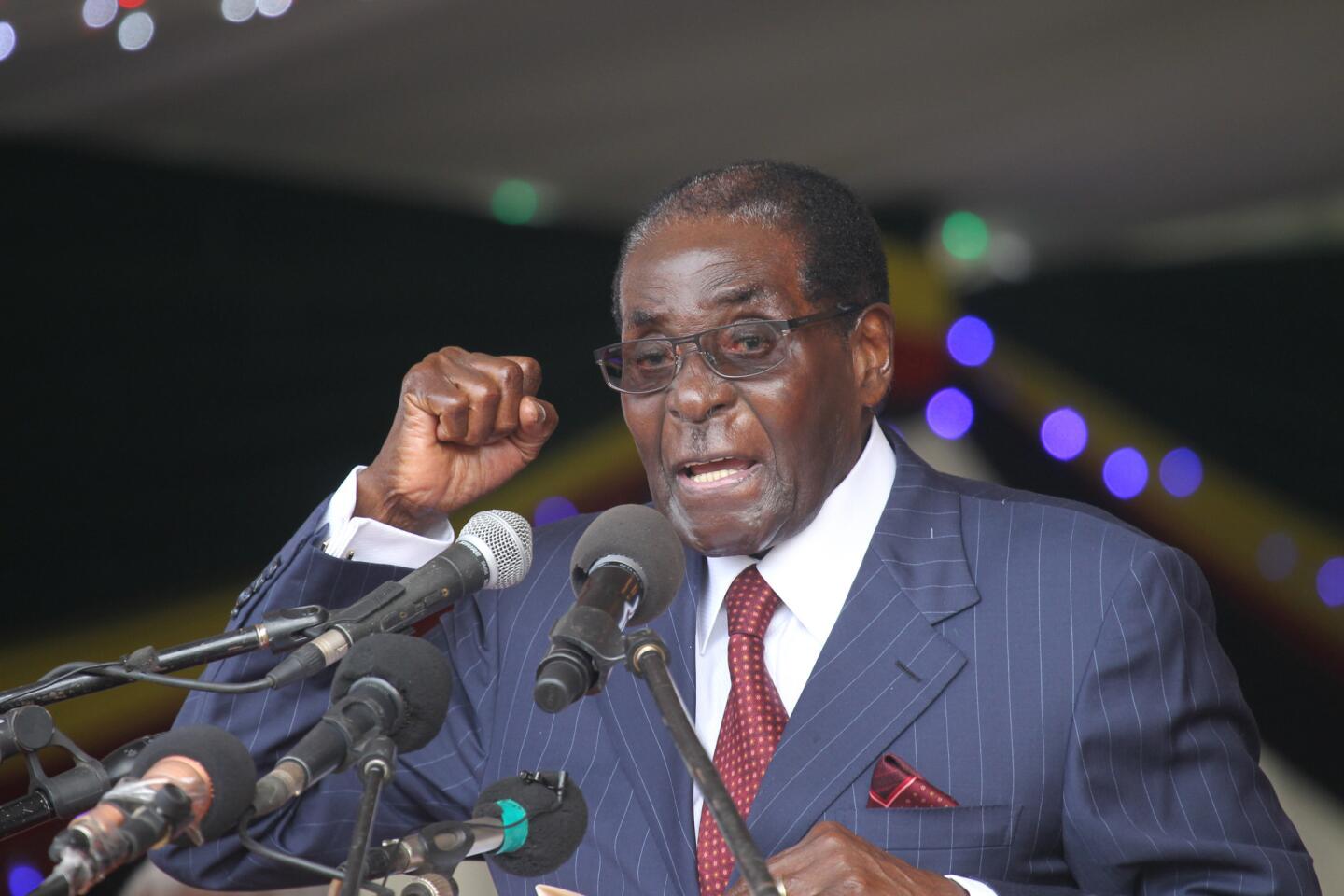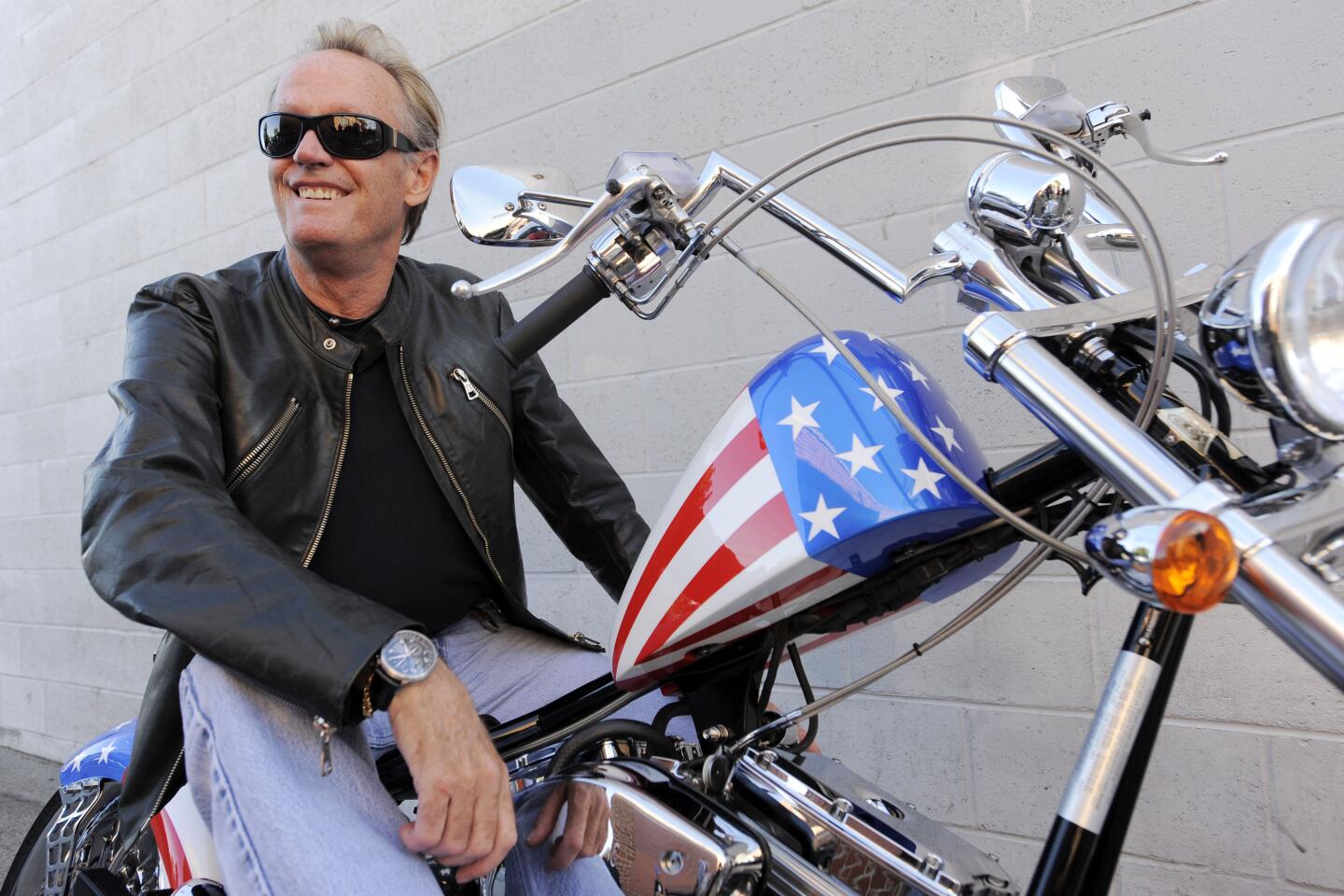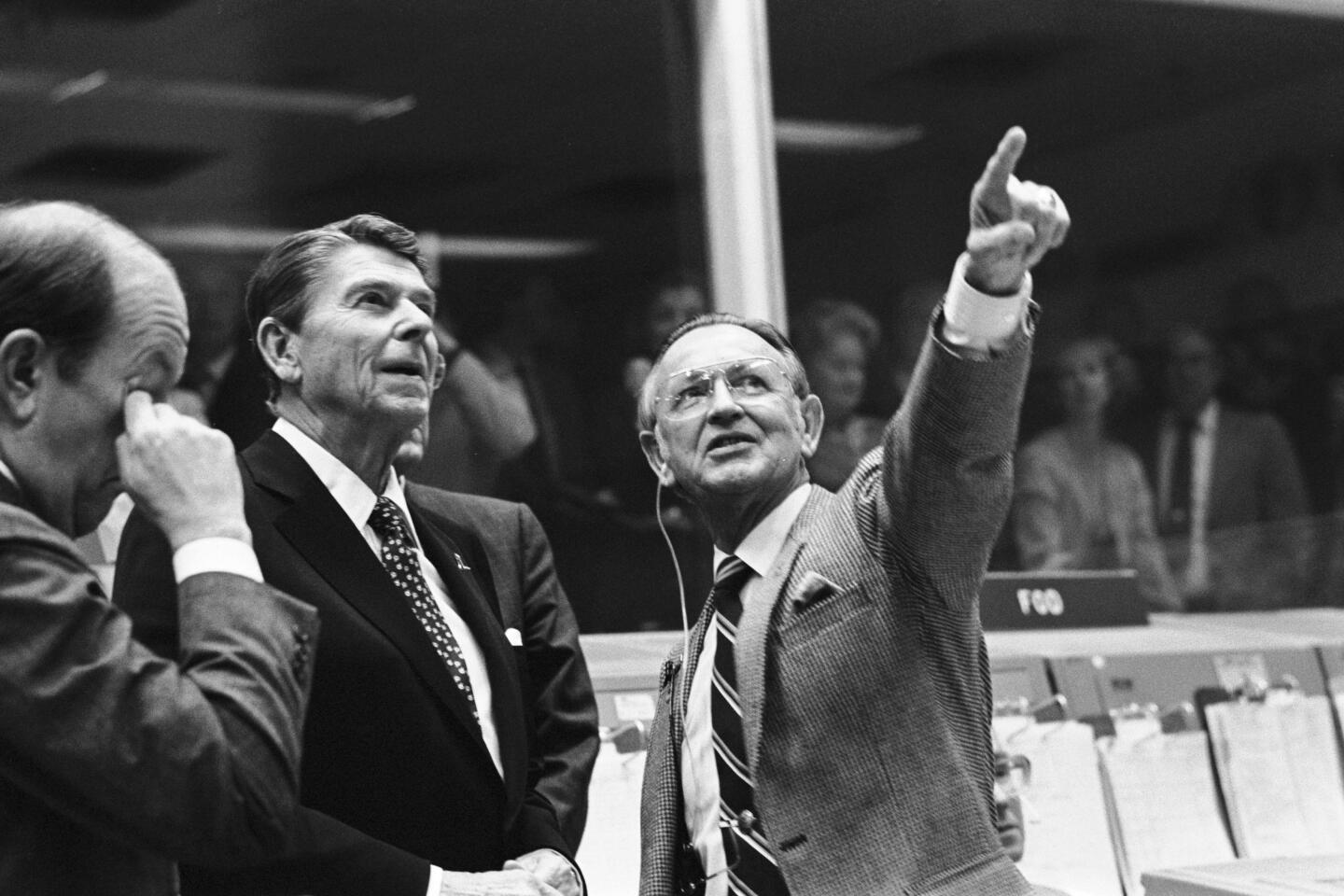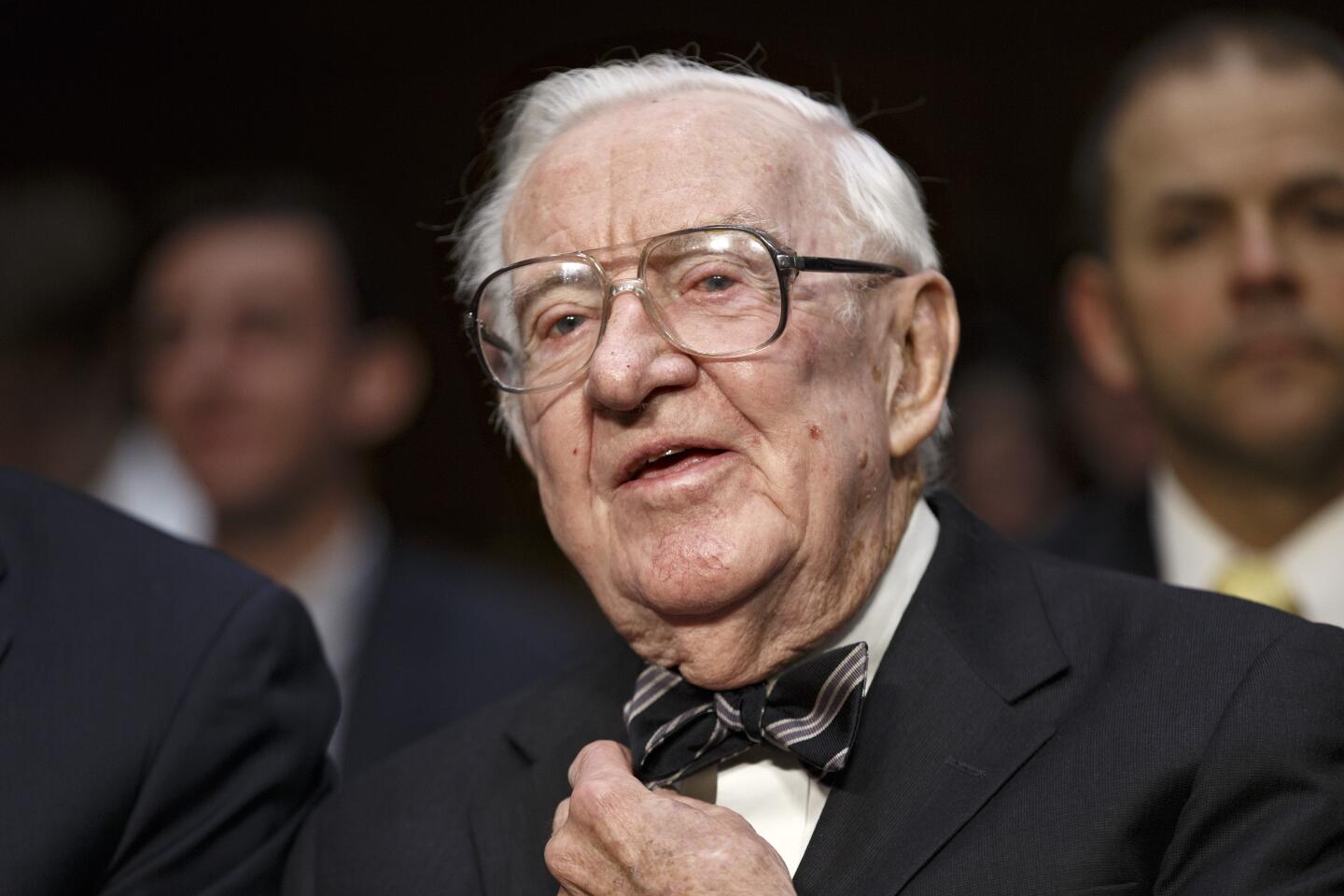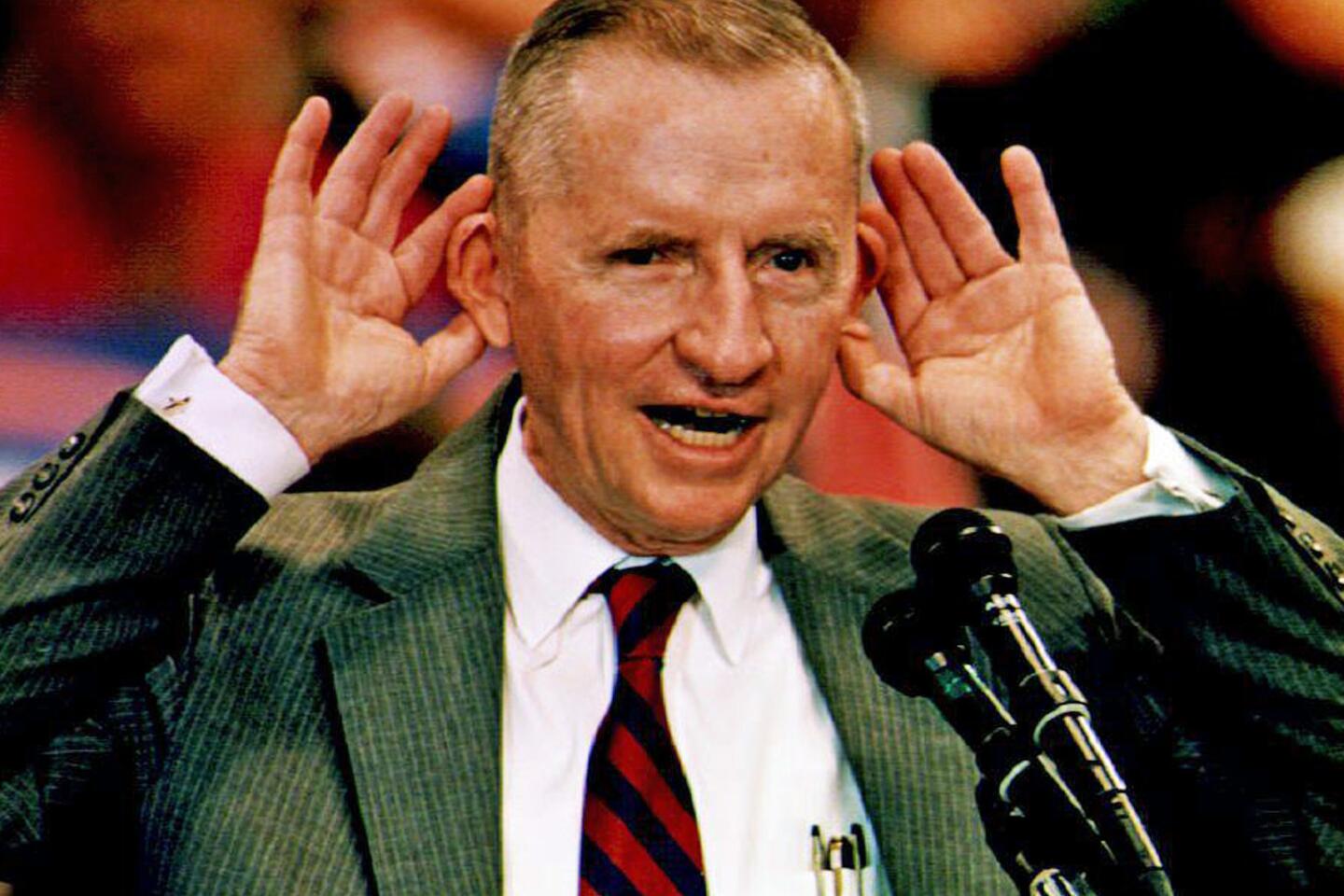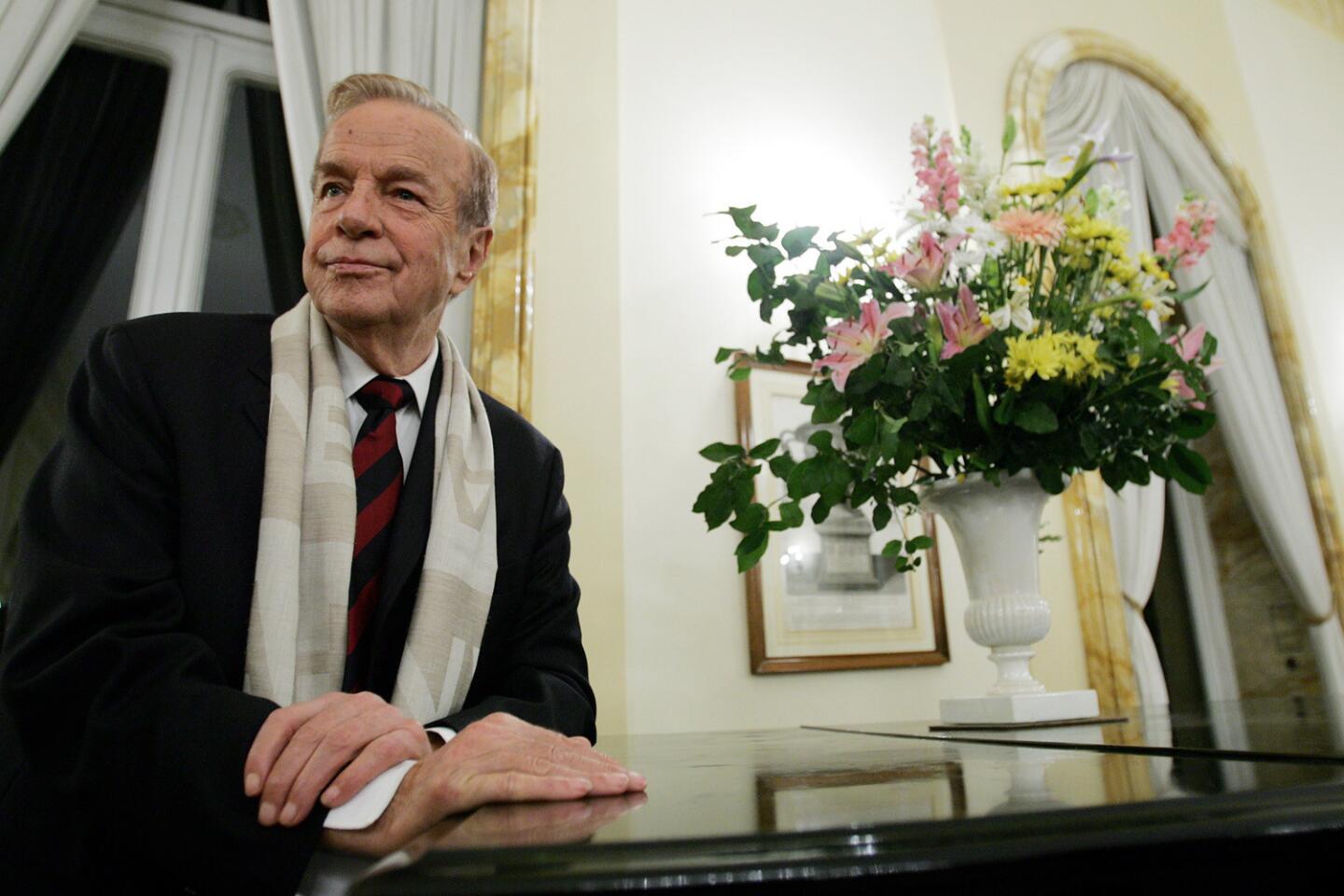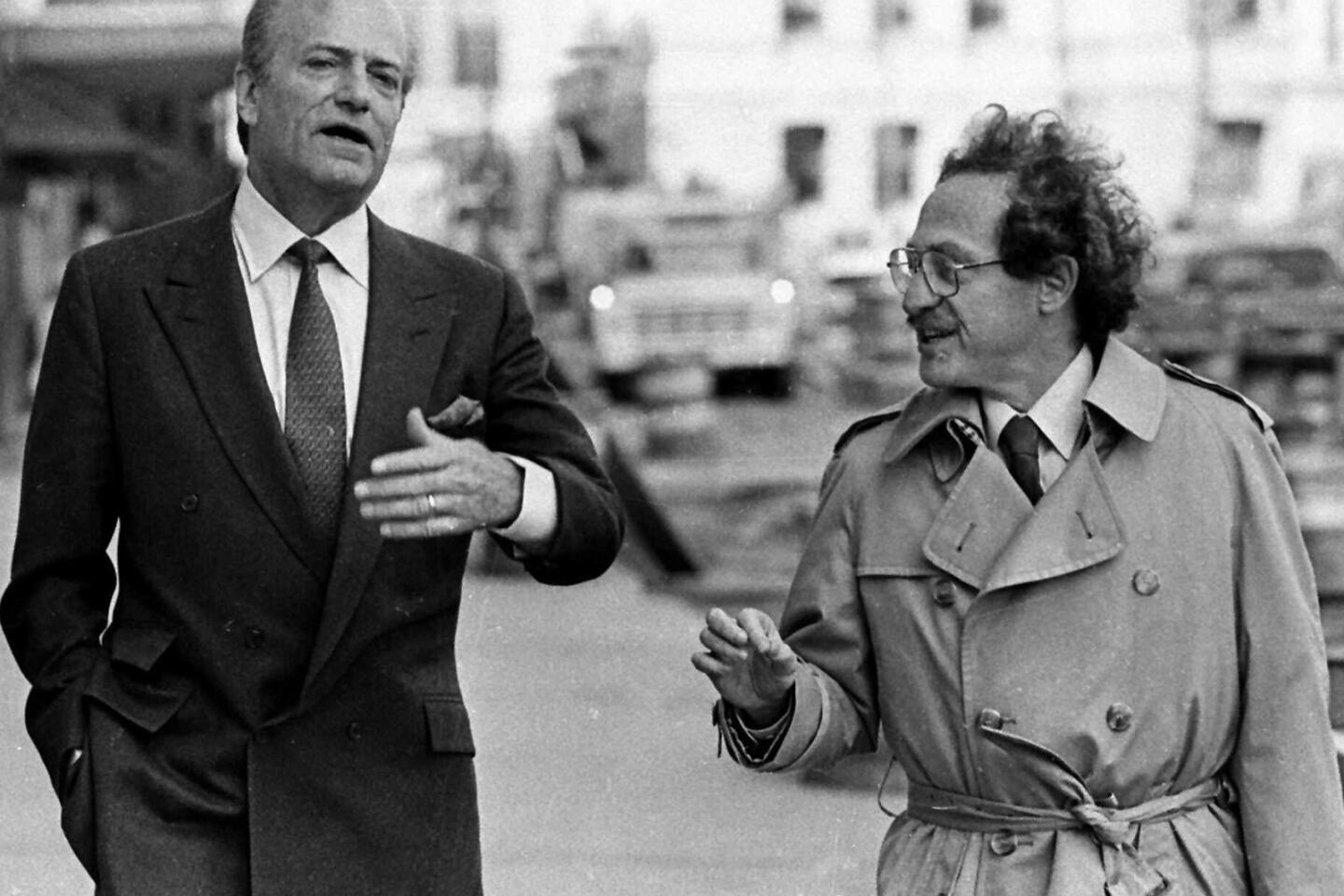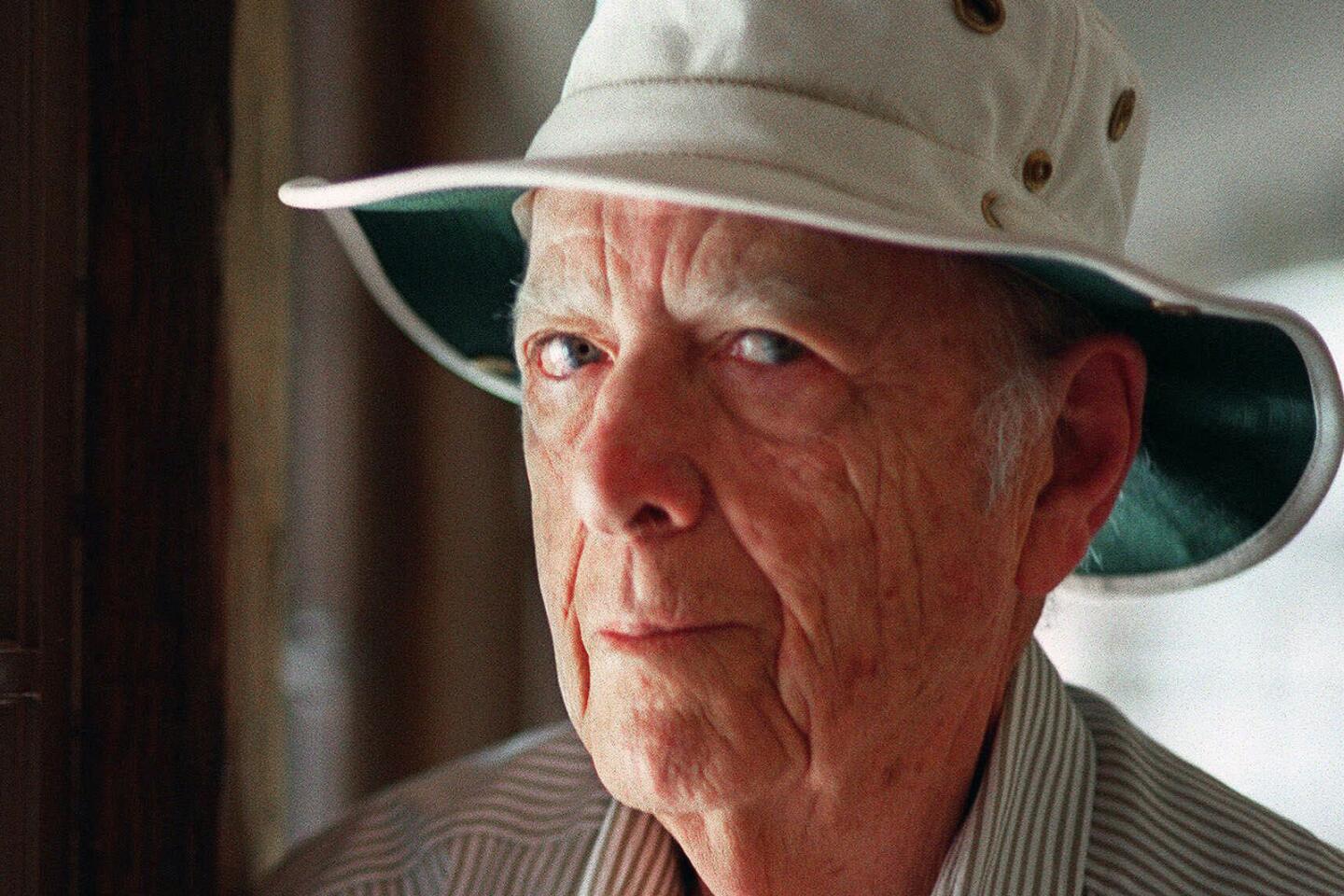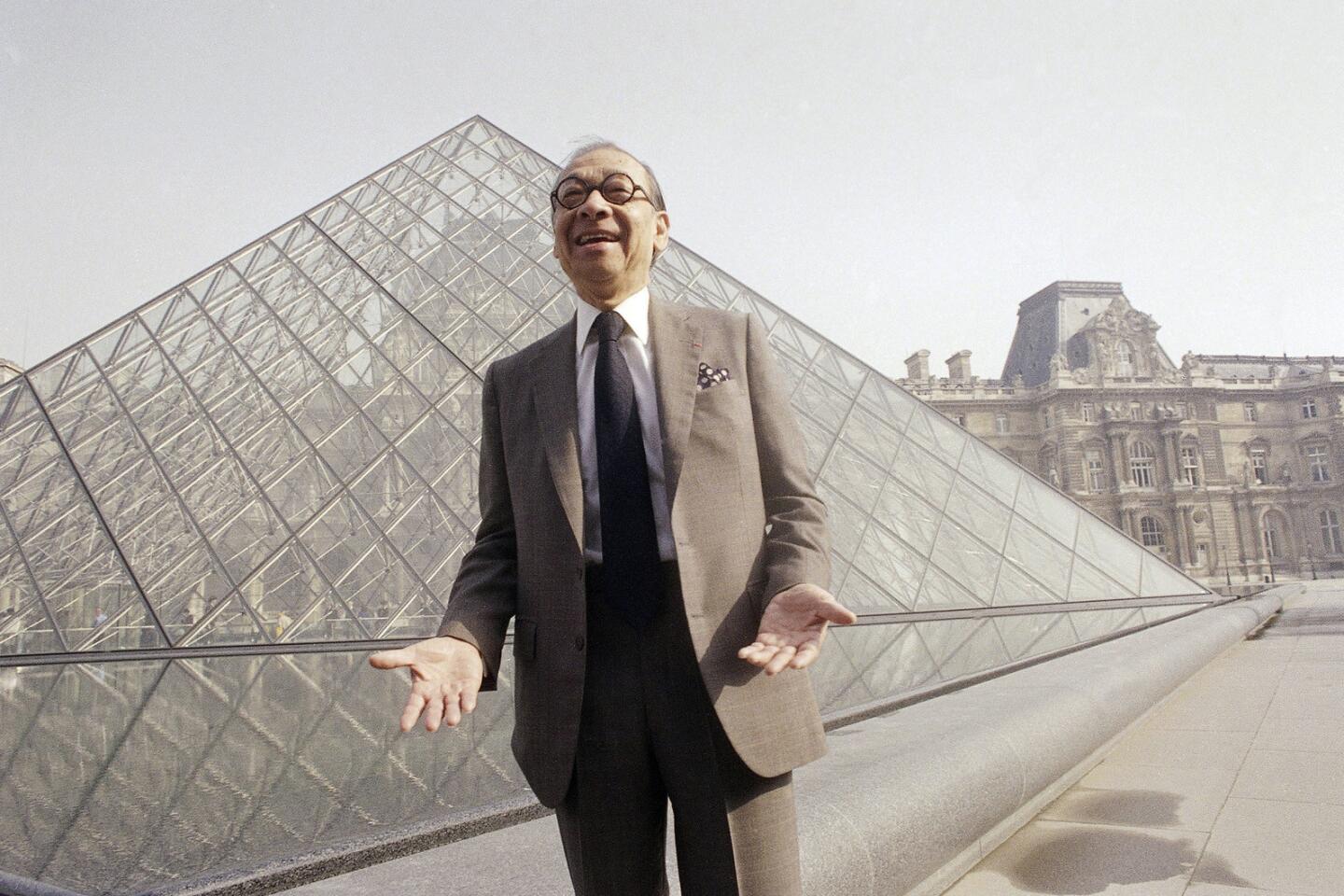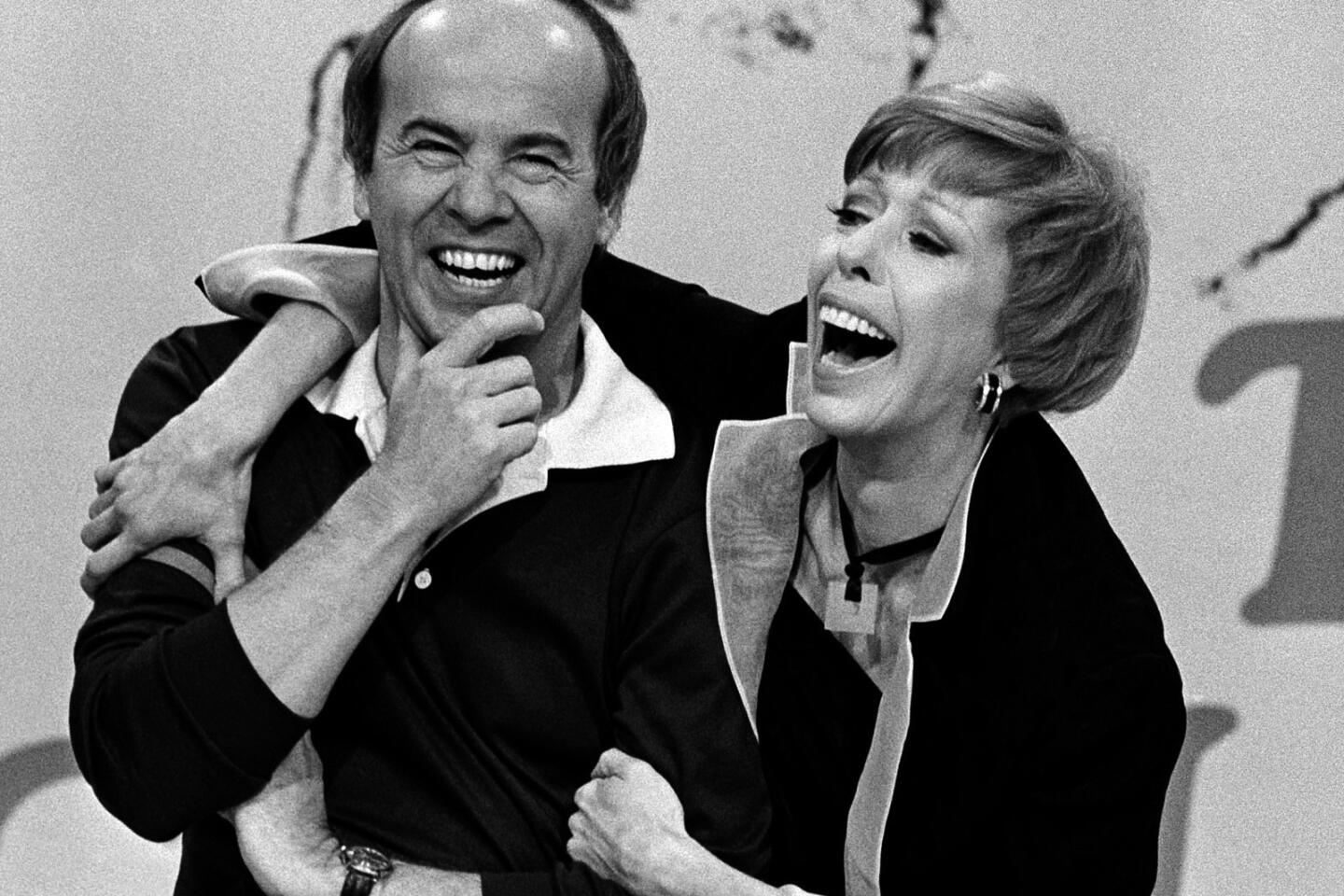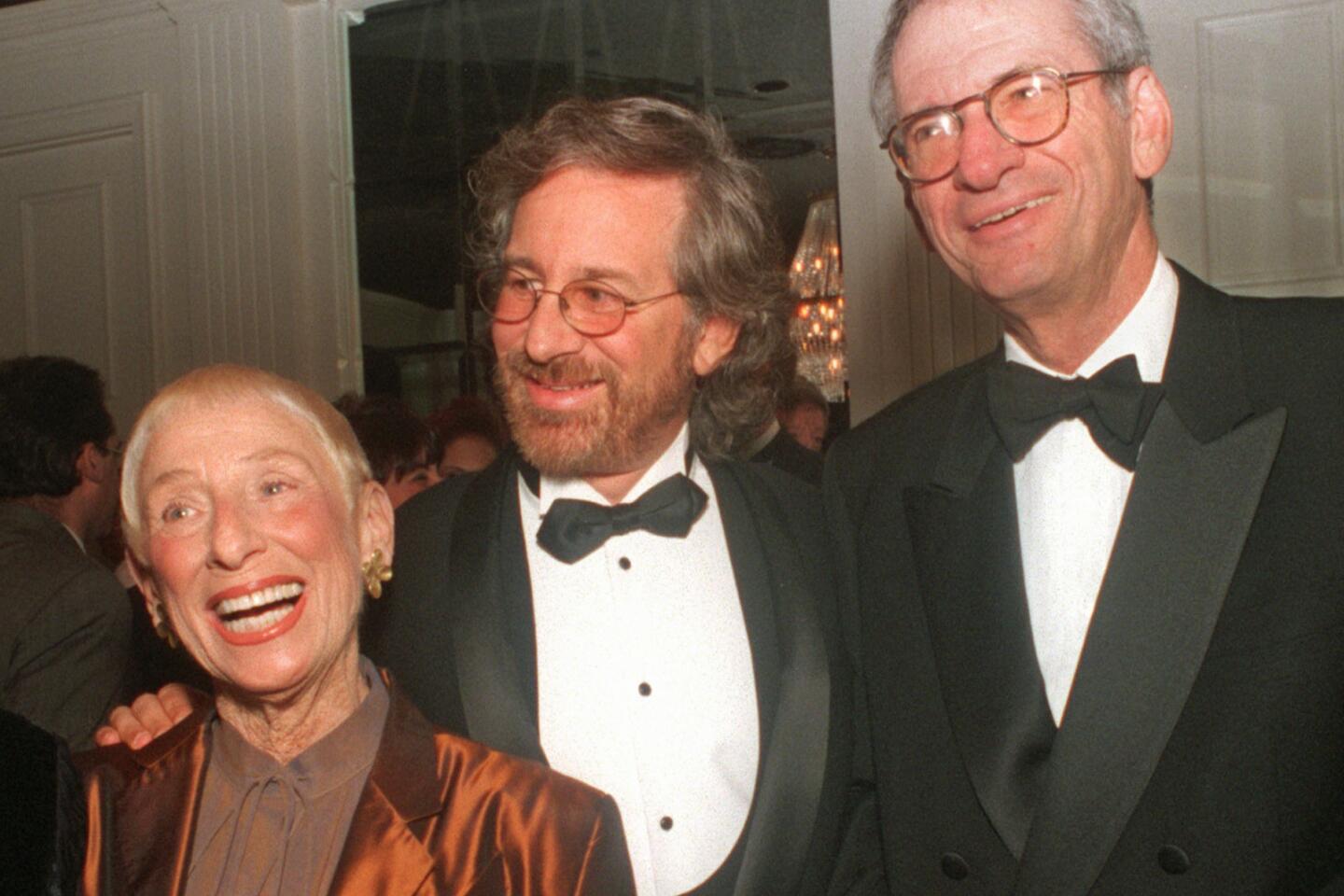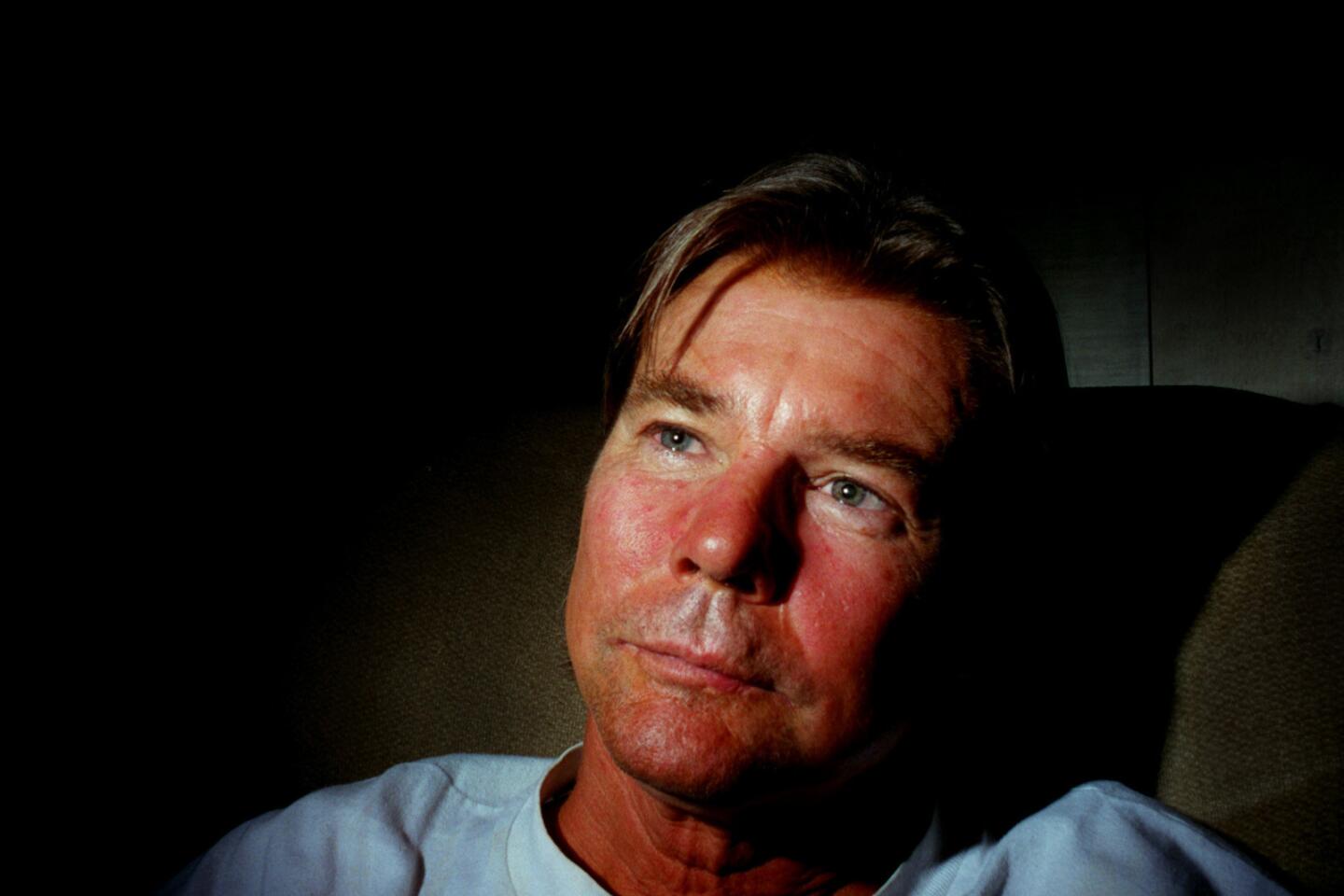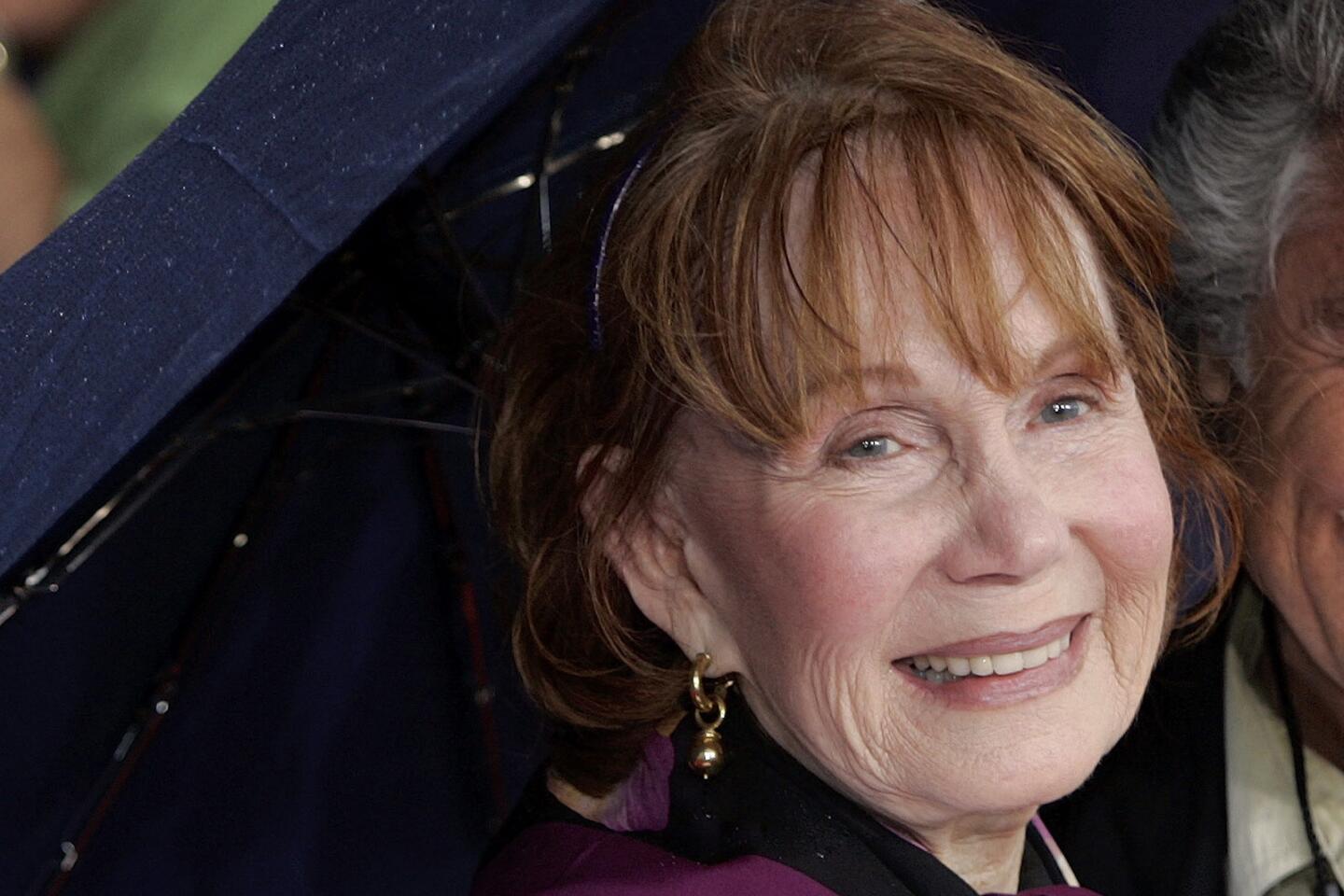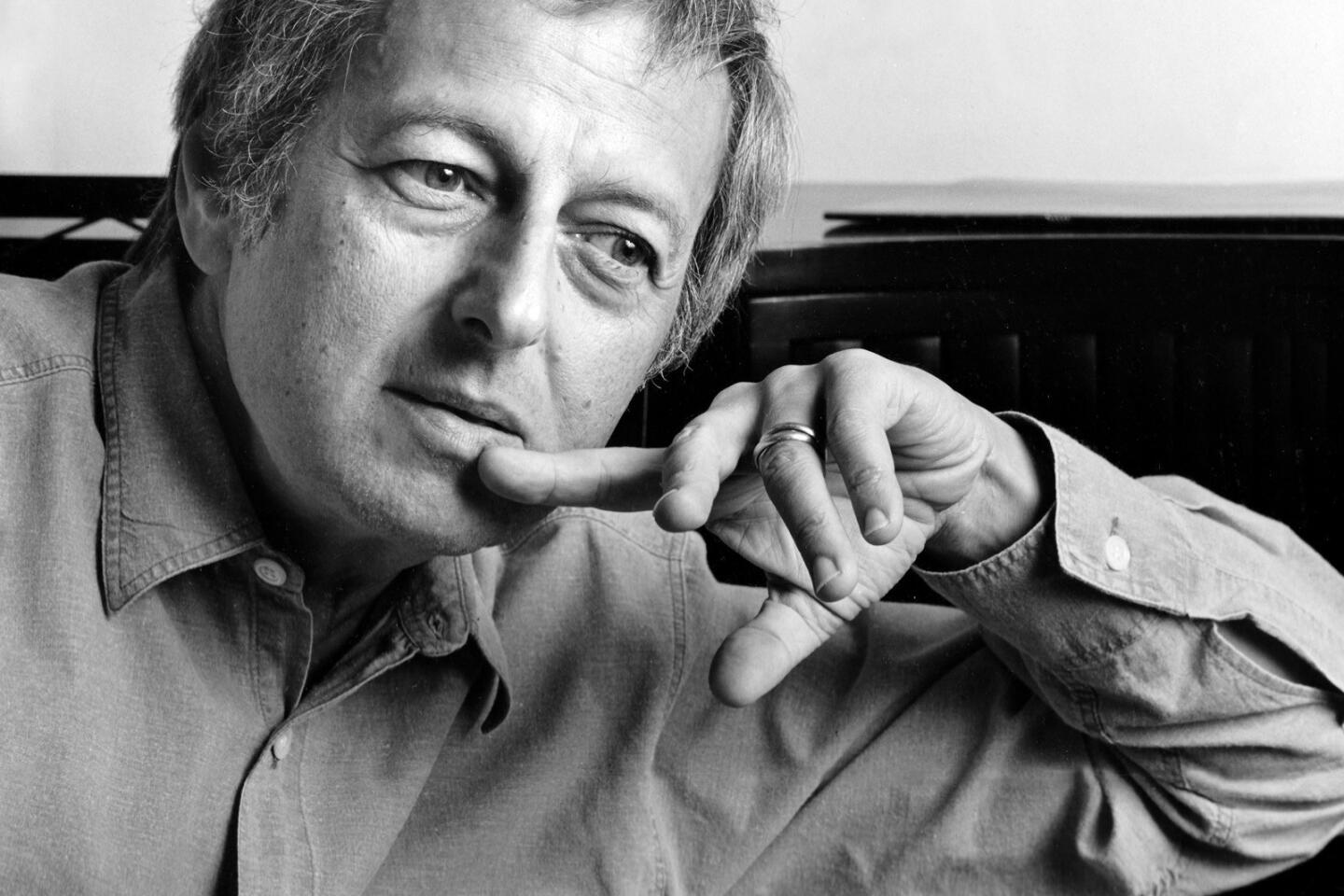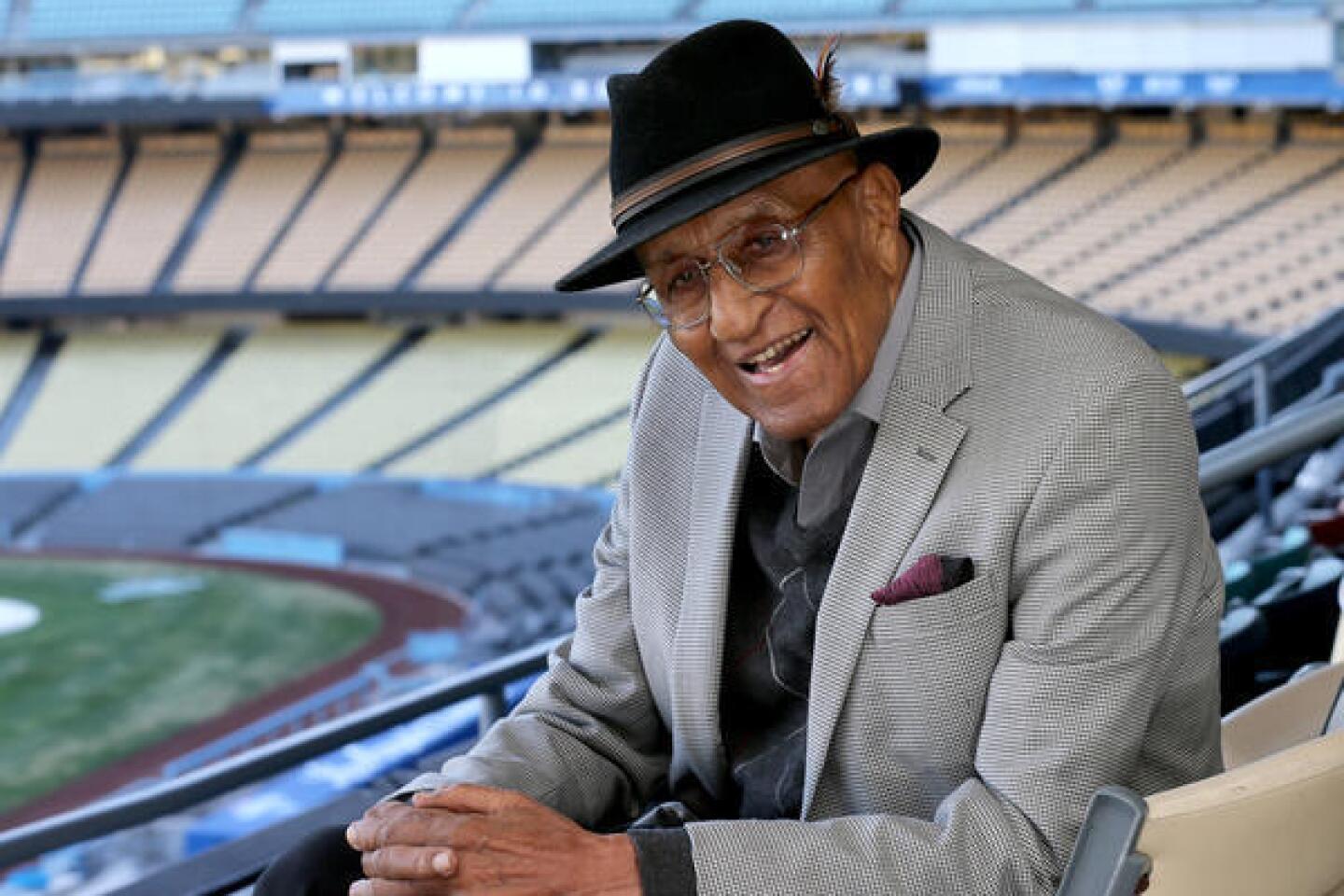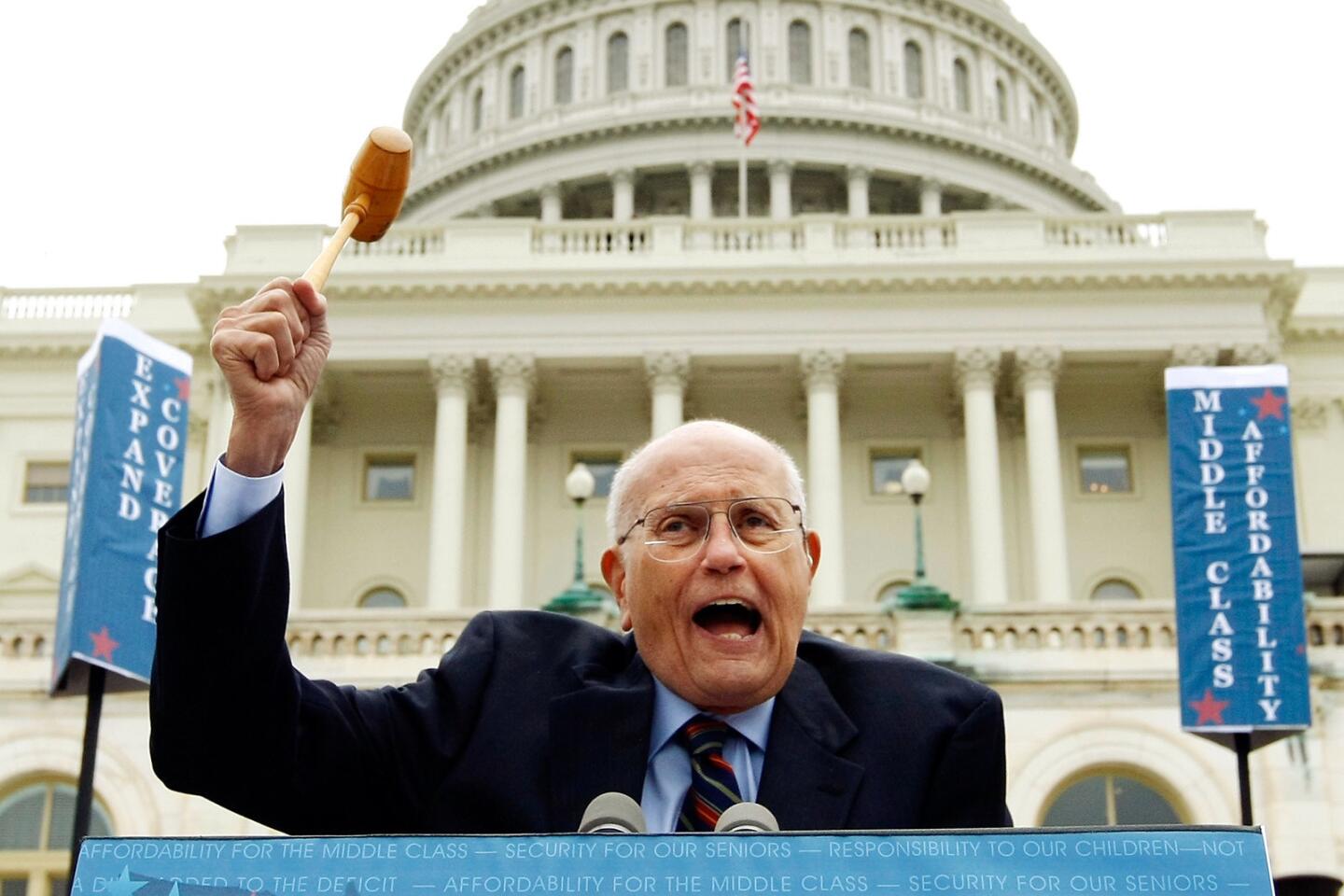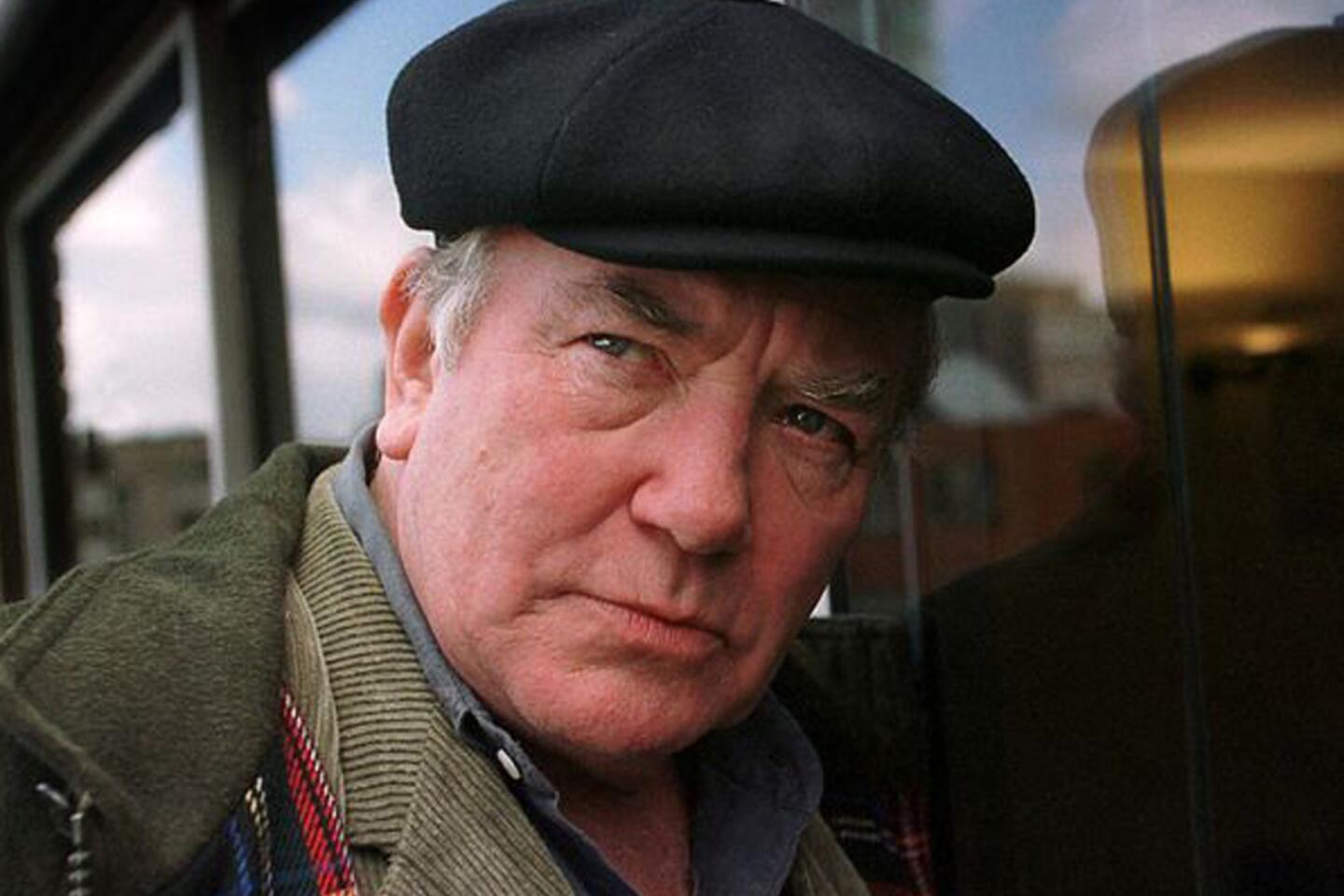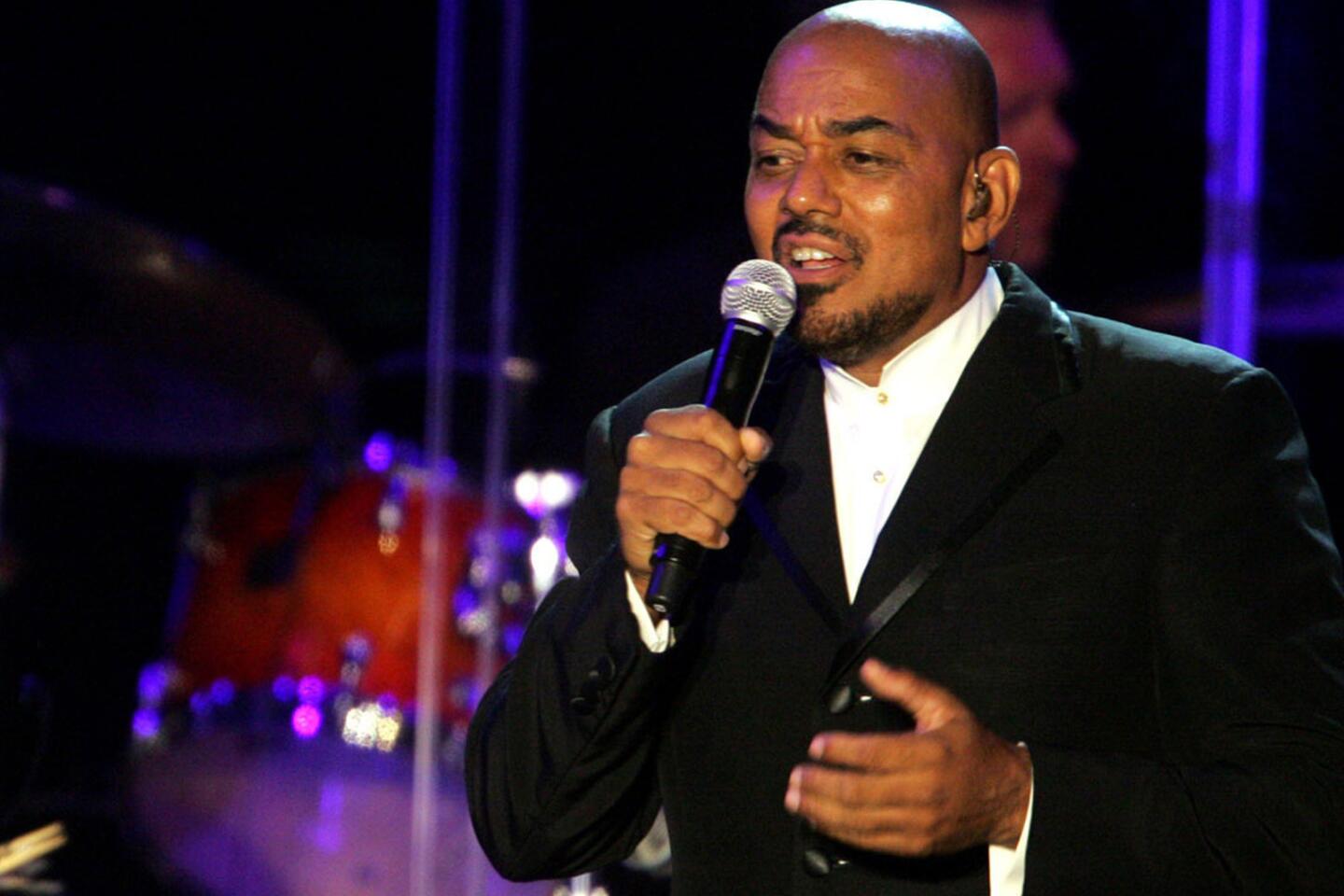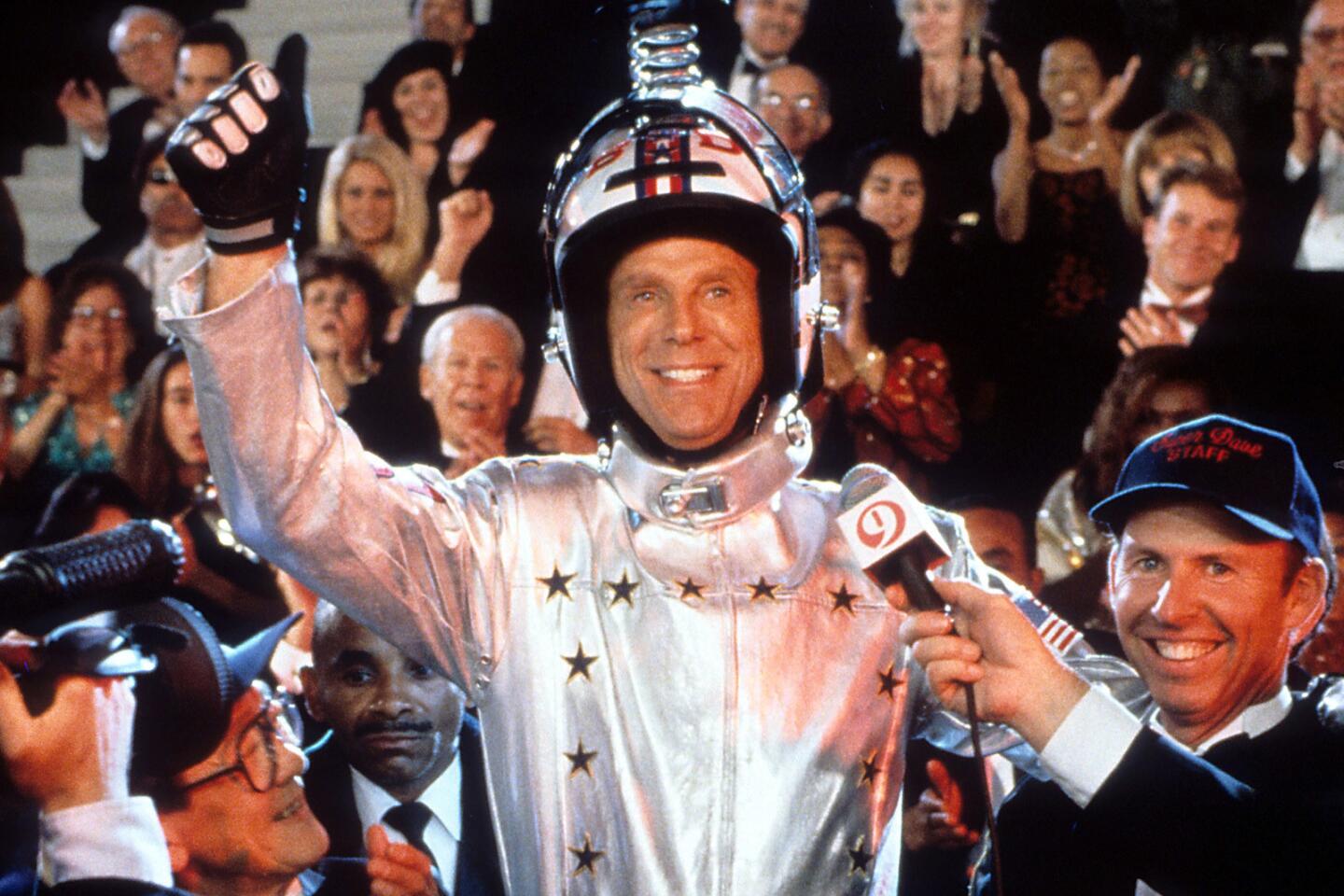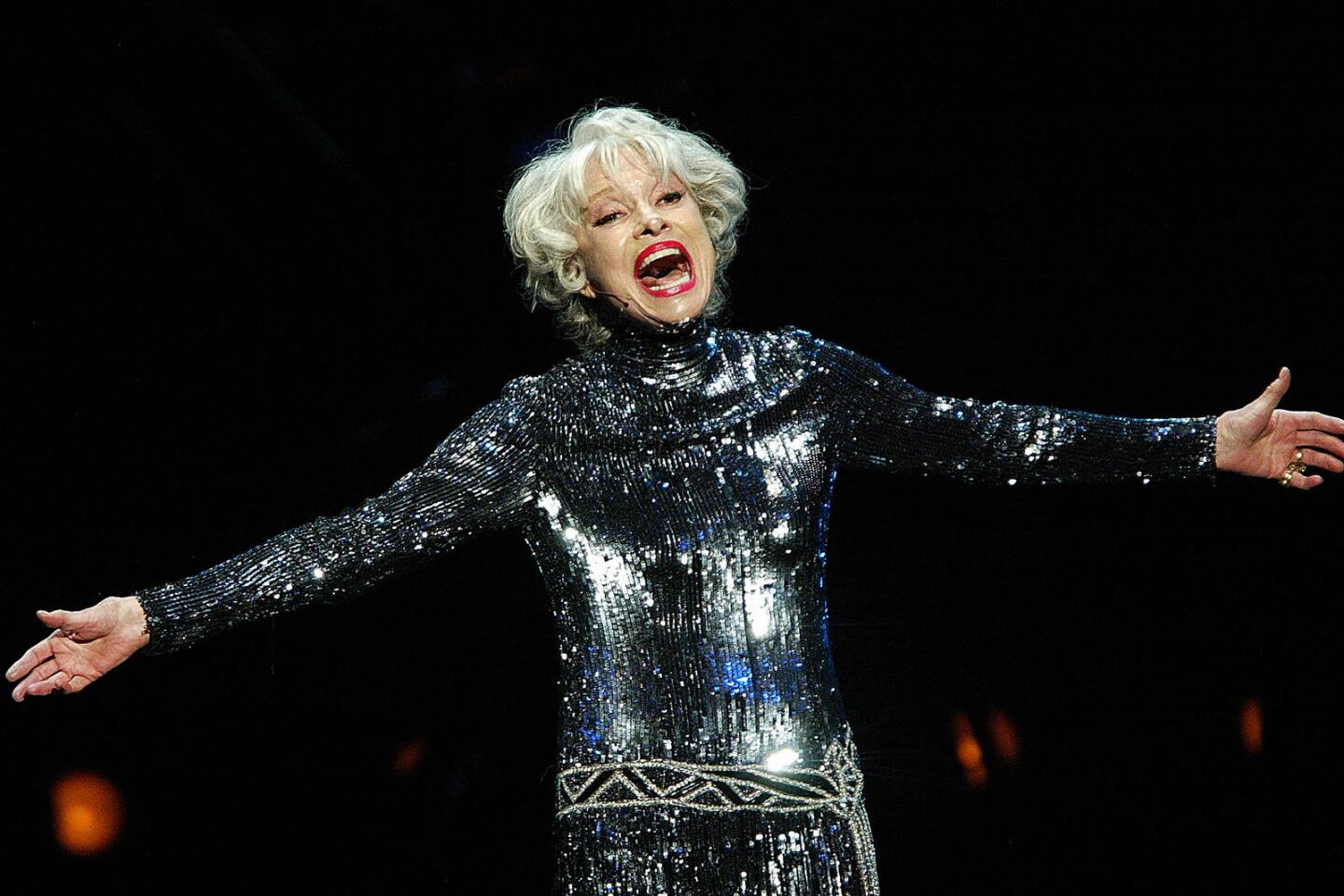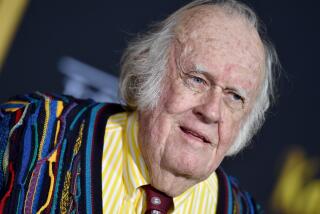Jan-Michael Vincent, a golden boy of Hollywood action films in the 1970s who starred in the mid-1980s TV adventure series “Airwolf” but saw his career crater amid drug and alcohol addiction, has died in Asheville, N.C.
The actor’s Feb. 10 death — which was not publicly announced at the time — was confirmed by the Buncombe County Register of Deeds, which provided a death certificate listing the cause as cardiac arrest. He was 74 by most accounts, but the certificate listed him as 73.
With a surfer’s physique and charisma, Vincent entered films in the late 1960s and became a mainstay of action dramas. He was the hitman apprentice to Charles Bronson in “The Mechanic” (1972) and a handsome young stuntman in “Hooper” (1978), with Burt Reynolds as an aging one.
A rare departure from form was “Buster and Billie” (1974), an unsentimental look at 1940s high school students in rural Georgia, with Vincent giving an understated performance as the local jock who breaks with social conformity and expectations — with violent results.
His biggest breakthrough was the male ingenue part in the ABC miniseries “The Winds of War” (1983), based on Herman Wouk’s bestselling novel set during World War II. He played a son of Robert Mitchum’s naval officer and the love interest of Ali MacGraw’s character.
The 18-hour program averaged tens of millions of viewers over the course of its broadcast, rivaling Alex Haley’s “Roots” in popularity. The next year, Vincent premiered in CBS’s action series “Airwolf” as Stringfellow Hawke, the moody pilot of a supersonic helicopter; Ernest Borgnine co-starred as an older pilot.
While on the show, where he earned a reported salary of $40,000 per episode, Vincent spoke of addictions that for years had kept him off the A-list of movie roles. His erratic behavior and cocaine consumption was a major reason “Airwolf” was canceled in 1986.
His screen credits dwindled amid a series of arrests for drunken driving and barroom altercations.
“A lot of my problems have been simply that I was in the wrong place at the wrong time,” the actor told an Australian newspaper the Sunday Mail in 1987.
In 1996, Vincent was in a car crash that severely injured a passenger — a female domestic worker in his home — while he suffered a broken neck and damaged vocal cords that left him with a permanent rasp to his voice. Over the years, various women, including his second wife, accused him of physical assault.
His right leg was partially amputated in 2012 amid complications from peripheral artery disease. As recently as 2014, he’d spoken of his continuing trouble with alcohol and owing $70,000 in back taxes.
Jan-Michael Vincent was born in Denver on July 15, 1944 — his death certificate says 1945 — and grew up in Hanford in the central San Joaquin Valley, where his parents owned a billboard company. He told People magazine that he had little patience for an office job and that after high school graduation in 1963, when his father tried to strong-arm him into joining the business, “I put my surfboard in the car and left.”
He settled in Ventura, where he surfed and attended Ventura College for three years. He said he would have completed college, but the registration clerk literally shut the window in his face for the lunch hour and Vincent instead took his $200 and went to Mexico to party.
He had just served a stint in the California National Guard when a casting agent, marveling at his good looks, got him a contract with Universal Studios. By the late 1960s, he was appearing on “Dragnet,” “Lassie,” “Bonanza” and the prime-time soap opera “The Survivors,” among other TV shows.
He won a supporting part in the John Wayne western “The Undefeated” (1969), then a co-starring role opposite Mitchum in “Going Home” (1971), as a troubled young man.
Vincent later appeared in Disney’s “The World’s Greatest Athlete” (1973), opposite Tim Conway, and “Big Wednesday” (1978), a drama about surfers facing the prospect of going to fight in Vietnam. Increasingly too drunk to remember his lines, he ended his career in D-grade fare such as “Rave Nerve” (1991), featuring former porn actress Traci Lords, and “White Boy” (2002), a gang-warfare story.
His marriages to Bonnie Poorman and Joanne Robinson ended in divorce. For years, he was estranged from his only child, Amber, a daughter from his first marriage. He had a home in Mississippi with his third wife, the former Patricia Christ. A complete list of survivors could not be immediately confirmed.
When interviewed a few years ago by an Australian TV reporter, Vincent said he struggled to recall much of anything about his career or the accidents that may have contributed to his failing memory. “I’m just laying low,” he said.
Bernstein writes for the Washington Post
2/33
Pioneering shock jock Don Imus was one of radio’s most popular and polarizing figures. Born in Riverside, he became a top broadcaster in New York, but he also sparked a national firestorm in 2007 with a racist remark about the Rutgers University women’s basketball team. He was 79. (Richard Drew / Associated Press)
3/33
Cokie Roberts covered Washington from Jimmy Carter to Donald Trump for NPR and ABC News. A co-anchor of the ABC Sunday political show “This Week” from 1996 to 2002, Roberts devoted most of her attention to Congress, where her father Hale Boggs was a House majority leader until his death in 1972. She was 75. (Donna Svennevik / Walt Disney Television via Getty)
4/33
T. Boone Pickens followed his father into the oil and gas business and built a reputation as a maverick, unafraid to compete against industry giants. In the 1980s, Pickens sought riches on Wall Street by leading bids to take over big oil companies including Gulf, Phillips and Unocal. Even when he failed to gain control of his targets, he scored huge payoffs by selling shares back to the company and dropping the hostile takeover bid. He was 91. (Riccardo Savi / Getty Images)
5/33
When Robert Mugabe took over as Zimbabwean president in 1980, he was celebrated as a hero in the liberation war against Britain. But after international sanctions, a series of fraudulent elections and an economic collapse sparked by the seizure of white-owned farms, Mugabe become a pariah and retired in 2017 rather than face impeachment. He was 95. (Tsvangirayi Mukwazhi / Associated Press)
6/33
David Koch was the aide de camp to Charles, his older brother, as the two leveraged the family fortune to push American politics to the right. The Koch brothers pushed the boundaries of dark money in politics and fueled a backlash against environmental regulations and government programs such as healthcare and mass transit. He was 79. (Phelan M. Ebenhack / Associated Press)
7/33
Peter Fonda was the son of a classic Hollywood star and a key player in the 1969 countercultural road trip saga “Easy Rider,” which he co-wrote and produced. The screenplay earned Fonda his first Academy Award nomination; his second came in the lead actor category for the 1997 independent film “Ulee’s Gold.” He was 79. (AP)
8/33
Hard-line Chinese premier Li Peng was best-known for ending the 1989 Tiananmen Square protests with a bloody crackdown by troops. A keen political infighter, he spent two decades at the pinnacle of power before retiring in 2002, leaving a legacy of prolonged economic growth and authoritarian control. He was 90. (AP)
9/33
Chris Kraft, shown with President Reagan in 1981, never flew in space but was the creator and longtime leader of NASA’s Mission Control. The legendary engineer served as flight director for all Mercury flights and seven of the Gemini flights, helped design the Apollo missions and later oversaw the beginning of the shuttle era at Johnson Space Center. He died just two days after the 50th anniversary of Apollo 11’s moon landing. He was 95. (AP)
10/33
Supreme Court Justice John Paul Stevens joined the court as a centrist Republican but emerged in his later years as the leading voice of its liberal bloc. Appointed by President Ford, Stevens played a key role in decisions that preserved a woman’s right to abortion, maintained a strict separation of church and state, and put limits on the death penalty. He was 99. (AP)
11/33
Billionaire Ross Perot blazed across America in the 1990s as a third-party presidential candidate and won nearly 19% of the popular vote in the 1992 election, finishing third behind Democrat Bill Clinton and Republican President George H.W. Bush. The diminutive Texan was an early tech entrepreneur who founded Electronic Data Systems, a computer services company, in 1962 with $1,000 in savings. He was 89.
(Peter Muhly / AFP/Getty Images) 12/33
Pitcher Tyler Skaggs grew up an Angels fan in Santa Monica and joined the organization as a first-round draft pick. He battled injuries throughout his career but started 24 games last season and showed signs of dominance this year. He was 27.
(Charlie Riedel / AP) 13/33
Judith Krantz wrote blockbuster romance novels including “Scruples” and “Princess Daisy” that sold more than 80 million copies worldwide. Her books have been translated into more than 50 languages, and seven have been adapted as TV miniseries, with her late husband, Steve Krantz, serving as executive producer for most. She was 91.
(Aaron Rapoport / Getty Images) 14/33
Italian director Franco Zeffirelli was best-known for his films, including the 1968 critical and box office hit “Romeo and Juliet” and a 1990 “Hamlet” with Mel Gibson. His massive opera productions included a version of Puccini’s “La Boheme” that became the most-often presented production in the Metropolitan Opera’s history. He was 96.
(Paolo Cocco / AFP/Getty Images) 15/33
Danish-born socialite Claus von Bulow, left, shown with attorney Alan Dershowitz in April 1985, was convicted in 1982 and then acquitted three years later on two counts of attempting to murder his American heiress wife, Sunny, with injections of insulin. The high-profile case has been called one of the most sensational courtroom dramas in modern U.S. history. He was 92.
(Charles Krupa / AP) 16/33
Herman Wouk explored the moral fallout of World War II in the Pulitzer Prize-winning “The Caine Mutiny” (1951) and other widely read books. Determined to produce a “great war book,” Wouk wrote “The Winds of War” and its sequel, “War and Remembrance,” in the 1970s, and the two sweeping novels became the basis for a pair of television miniseries. He was 103.
(Douglas L Benc Jr / AP) 17/33
Architect I.M. Pei had a client list that included French President Francois Mitterrand for the Louvre and Jacqueline Kennedy Onassis for the John Fitzgerald Kennedy Library in Boston. Among several Pei projects in the Los Angeles area are the former Creative Artists Agency headquarters in Beverly Hills and the Ronald Reagan UCLA Medical Center. He was 102.
(Pierre Gleizes / AP Photo) 18/33
Tim Conway came to prominence on television as a bumbling ensign in “McHale’s Navy” opposite Ernest Borgnine from 1962 to 1966, then became a regular on “The Carol Burnett Show,” where he famously developed a knack for making costar Harvey Korman crack up. He also starred in the “Apple Dumpling Gang” movies in the 1970s and gained fame with a new generation as the voice of Barnacle Boy on “SpongeBob SquarePants.” He was 85.
(George Brich / AP) 19/33
John Singleton’s 1991 debut, “Boyz n the Hood,” was an inner-city coming-of-age story that earned two Oscar nominations and put the young filmmaker in the company of emerging black moviemakers such as Spike Lee and Mario Van Peebles. Singleton went on to direct “Poetic Justice” (1993), “Higher Learning” (1995) and “Baby Boy” (2001), which featured Taraji P. Henson at the start of her career. He was 51.
(Christopher Polk / AFP/Getty Images) 20/33
Grammy-nominated rapper Nipsey Hussle was gunned down outside his Marathon Clothing store in the same South L.A. neighborhood where he was known as much for his civic work as he was for his hip-hop music. He was 33.
(Matt Winkelmeyer / Getty Images for Warner Music) 21/33
Sidney Sheinberg, right, with Steven Spielberg and Lea Adler, Spielberg’s mother, at a 1994 Beverly Hilton gala.
(Shepler, Lori / Los Angeles Times) 22/33
Jan-Michael Vincent was a golden boy of 1970s Hollywood action films and went on to star in the mid-1980s TV adventure series “Airwolf.” But his erratic behavior and cocaine consumption was a major reason “Airwolf” was canceled. He was 74 by most accounts, but the death certificate listed him as 73.
(Alex Garcia / Los Angeles Times) 23/33
Sitcom star Katherine Helmond had memorable roles as ditzy matriarchs in “Soap,” “Who’s the Boss?” and “Coach.” Her work as Jessica Tate on the 1970s parody “Soap” earned her seven Emmy nominations, and she was nominated again in 2002 for her guest role in “Everybody Loves Raymond.” Helmond also starred in director Terry Gilliam’s films “Brazil” and “Time Bandits.” She was 89.
(Chuck Burton / AP) 24/33
André Previn conquered L.A. with his artistic genius twice: first as an Academy Award winning composer of Hollywood movie music, then as music director of the Los Angeles Philharmonic. A conductor and pianist who toggled between classical, pop and jazz, Previn won Oscars for “My Fair Lady” (1964), “Irma la Douce” (1963), “Gigi” (1958) and “Porgy and Bess” (1959). He was 89.
(Patrick Downs/ Los Angeles Times) 25/33
Dodgers right-hander Don Newcombe was the first outstanding African American pitcher in the major leagues and in 1949 became the first to start a World Series game. The 6-foot-4, 240-pound hurler was also the first player in major league history to have won the rookie of the year, Most Valuable Player and Cy Young awards. He was 92.
(Luis Sinco / Los Angeles Times) 26/33
Michigan Democrat John Dingell Jr. used his considerable power in the House of Representatives to uncover government fraud and defend the interests of the automobile industry. Known as “Big John” and “The Truck” for his forceful nature and 6-foot-3-inch frame, Dingell was the longest-serving member of Congress in U.S. history. He was 92.
(Win McNamee / Getty Images) 27/33
Albert Finney starred in films as diverse as “Tom Jones,” “Annie” and “Skyfall.” One of the most versatile actors of his generation, he played an array of roles, including Winston Churchill, Pope John Paul II, a southern American lawyer and an Irish gangster. He was 82.
(Graham Barclay / For The Times) 28/33
Michelle King was the first African American woman to lead Los Angeles Unified School District. Her major accomplishment was pushing the graduation rate to record levels by allowing students to quickly make up credits for failed classes. She was 57.
(Al Seib / Los Angeles Times) 29/33
Grammy-winning singer and songwriter James Ingram topped the charts in the ‘80s with hits like “Baby, Come to Me” and “Somewhere Out There.” He also co-wrote the Michael Jackson hit “P.Y.T. (Pretty Young Thing).” He was 66.
(Stefano Paltera / AP) 30/33
Emmy Award-winning writer Bob Einstein was best known as stuntman Super Dave Osborne, whose feats always went wrong. The comedy veteran got his start writing for 1970s variety shows such as “The Smothers Brothers Comedy Hour,” and he later played Larry David’s devout friend Marty Funkhouser on HBO’s “Curb Your Enthusiasm.” He was 76.
(Archive Photos / Getty Images) 31/33
Carol Channing was a Broadway star best known for her enduring portrayal of the title character in the musical “Hello, Dolly!” A winner of three Tony Awards, including one for lifetime achievement, she appeared in the play at least 5,000 times. She was 97.
(Frederick M. Brown/Getty Images / Frederick M. Brown/Getty Images) 32/33
Mary Oliver, one of the country’s most popular poets, focused on spirituality, nature and New England. Her poems won the Pulitzer Prize in 1984 and the National Book Award in 1992. She was 83.
(Josh Reynolds / For the Times) 33/33
Herb Kelleher built Southwest Airlines into the biggest discount carrier and set the standard for budget air travel for more than three decades. He and co-founder Rollin King used a formula of short, no-frills trips that spawned dozens of imitators. He was 87.
(Ed Betz / AP) 